I’m continually thrilled by the Messianic symbolism YHWH has hidden in the Scripture for us to find. To me it’s the ultimate treasure hunt, with each new find bringing additional depth and beauty to our Creator’s plan of reconciliation for all mankind.
Right up front I’ll admit my bias, I believe the Bible to be the inspired words of YHWH. When there are passages that don’t make any sense or seem down right funky I like to look a these parts as a wonderful puzzle to solve. A good example of what I am talking about is the order and number of sacrifices prescribed during the Biblical feast days. If you’ve read my article An Old Testament Enigma or The Messiah Factors you already know there is more to the arrangement of Old Testament sacrifices offered during the Feast of Tabernacles.
Since Passover 2014 is just days away I thought I would share a little bit different perspective on this wonderful Biblical holy day which is so symbolic of Yeshua’s sacrifice on our behalf.
I know many today hold to the belief that in order for Yeshua to fulfill the symbolic nature of this Biblical feast he had to be crucified at the same time as all the other “Passover” lambs on the 14th of Nisan. There are several reasons I do not hold this belief. The first, and most important reason is it would require me to take the gospel accounts at something other than face value and by doing so it needlessly confuses the rest of the Passover week chronology. The second, is that I think that holding this position does not allow us to see a greater symbolic picture which Yeshua fulfilled in regards to this Biblical feast day.
Let’s start with gospel accounts:
Matthew 26:18-20 17 Now the first day of the feast of unleavened bread the disciples came to Jesus, saying unto him, Where wilt thou that we prepare for thee to eat the passover?…19 And the disciples did as Jesus had appointed them; and they made ready the passover. 20 Now when the even was come, he sat down with the twelve.
Mark 14:12-18 12 And the first day of unleavened bread, when they killed the passover, his disciples said unto him, Where wilt thou that we go and prepare that thou mayest eat the passover?…. and they made ready the passover. 17 And in the evening he cometh with the twelve. 18 And as they sat and did eat,
Luke 22:8-15 8 And he sent Peter and John, saying, Go and prepare us the passover, that we may eat…. and they made ready the passover. 14 And when the hour was come, he sat down, and the twelve apostles with him. 15 And he said unto them, With desire I have desired to eat this passover with you before I suffer:
John 13:1-2 Now before the feast of the passover, when Jesus knew that his hour was come that he should depart out of this world unto the Father, having loved his own which were in the world, he loved them unto the end. 2 And supper being ended, the devil having now put into the heart of Judas Iscariot, Simon’s son, to betray him;
Taken at face value the above passages show that Yeshua ate the Passover supper with his disciples at the same time as the rest of Jerusalem. Some have used the passage in John 13 to claim that Yeshua kept a special teaching “supper” with his disciples before the real Passover supper. Matthew, Mark and Luke do not support this position. If you have read my article Even unto Even and the Exodus Day then you know the Scripture is perfectly clear that the Passover lambs are killed before “even” on the 14th which was just before sunset beginning the15th day of Nisan . (And the start of the 7 days of Unleavened Bread.)
To avoid confusion I think it would be helpful here to define the two ways the term “passover” is used in the Bible. In the specific sense the Hebrew term pecach (Passover) comes from the Hebrew root pacach which means to “pass over”. In a majority of cases the term is used to designate the commemorative Passover supper as kept by the Israelites the night before they exited Egypt.
Exodus 12:11-13 11 And thus shall ye eat it; with your loins girded, your shoes on your feet, and your staff in your hand; and ye shall eat it in haste: it is the YHWH’S passover. 12 For I will pass through the land of Egypt this night, …… and when I see the blood, I will pass over you, and the plague shall not be upon you to destroy you, when I smite the land of Egypt.
As I showed in my article on the Exodus Day , Israel sacrificed the Passover lamb late on the 14th day of Nisan just before the 15th. Later that night (on the 15th) all Israel ate the Passover supper.
The term Passover is also used in a more general sense to designate the entire 7 day Feast of Unleavened Bread. (The Passover “supper” beginning this 7 day feast.) Here are a couple of examples:
Ezekiel 45:21 21 In the first month, in the fourteenth day of the month, ye shall have the passover, a feast of seven days; unleavened bread shall be eaten.
Luke 22:1 Now the feast of unleavened bread drew nigh, which is called the Passover.
Josephus also shows that the term Passover was used to represent the entire 7 day Feast of Unleavened Bread. Ant. 14:21; Ant. 17:213; Ant. 18:29; Jwr. 2:10
* * *
Even though the New Testament does not show that Yeshua was killed at the same time as the other Passover lambs there is a bigger picture related to the “Passover” that I think many are missing.
First of all, the fact is the Passover lambs were not killed on the “feast day” proper. The Passover lambs were killed during the day of the 14th of Nisan just before sundown of the 15th. In my opinion and I think the Biblical record bears this out, both contextually and symbolically Yeshua had to be killed on the “feast day” proper (i.e. the 15th). Contextually the above gospel accounts show that Yeshua ate the Passover with his disciples as prescribed by the Law. This would place his death during the daytime hours of the 15th of Nisan about the same time as the sin atonement sacrifice was offered by the high priest.
The gospel accounts aside the apostle Paul’s in 1 Cor. 5:7-8 refers to Yeshua as “our passover” in the context of the feast of unleavened bread. Later in 1 Cor. 11:23-26 Paul shows that the “bread” and “cup” of the Passover supper kept by Yeshua and the disciples was, in Yeshua’s own words, a symbol of the Messiah’s death and resurrection. As such this service should be kept in remembrance of Yeshua until he comes again.
1 Corinthians 5:7-8 7 Purge out therefore the old leaven, that ye may be a new lump, as ye are unleavened. For even Christ our passover is sacrificed for us: 8 Therefore let us keep the feast, not with old leaven, neither with the leaven of malice and wickedness; but with the unleavened bread of sincerity and truth.
1 Corinthians 11:23-26 23 For I have received of the Lord that which also I delivered unto you, That the Lord Jesus the same night in which he was betrayed took bread: 24 And when he had given thanks, he brake it, and said, Take, eat: this is my body, which is broken for you: this do in remembrance of me. 25 After the same manner also he took the cup, when he had supped, saying, This cup is the new testament in my blood: this do ye, as oft as ye drink it, in remembrance of me. 26 For as often as ye eat this bread, and drink this cup, ye do shew the Lord’s death till he come.
I know some will argue that Paul’s reference above to Yeshua as our “passover” means that Yeshua had to be killed at the same time as the other “Passover” lambs. As I showed above, the term “Passover” is used in both a general and specific sense. In order to not contradict the gospel accounts the term “passover” in 1 Cor. 5 (above) must be understood in the general sense. Indeed, it was not until the 15th of Nisan that an sin atonement sacrifice was offered.
* * *
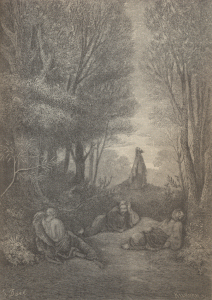 For the sake of argument let’s take the gospel accounts at face value. Let’s assume that Yeshua did in fact eat the Passover supper with his disciples and the rest of Jerusalem during the early evening hours which began the 15th of Nisan. Later that night, still the 15th of Nisan, Yeshua took the disciples into the garden of Gethsemane to pray.
For the sake of argument let’s take the gospel accounts at face value. Let’s assume that Yeshua did in fact eat the Passover supper with his disciples and the rest of Jerusalem during the early evening hours which began the 15th of Nisan. Later that night, still the 15th of Nisan, Yeshua took the disciples into the garden of Gethsemane to pray.
Now contrast this with the events of the Exodus Day. That very night about 1500 years earlier the blood on the doors posts of Israelites protected them from the angle of death. Yeshua that very same night shed his blood in “great drops” petitioning the Father. Instead of an angel sent to kill that night an angel was sent to strengthen.
Luke 22:43-44 43 And there appeared an angel unto him from heaven, strengthening him. 44 And being in an agony he prayed more earnestly: and his sweat was as it were great drops of blood falling down to the ground.
About the same time Israel was leaving Egypt with their “unleavened bread” upon their shoulders, Yeshua, the unleavened “bread of heaven”, bore (on His shoulders) a cross and the sins of mankind on his way to pay the righteous price for our reconciliation to our Creator.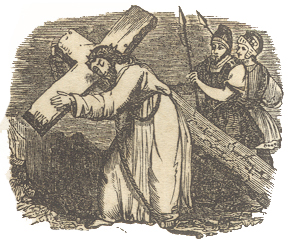
Exodus 12:34 34 And the people took their dough before it was leavened, their kneading troughs being bound up in their clothes upon their shoulders.
John 19:17-18 17 And he bearing his cross went forth into a place called the place of a skull, which is called in the Hebrew Golgotha: 18 Where they crucified him, and two other with him, on either side one, and Jesus in the midst.
Matthew 27:31-32 31 And after that they had mocked him, they took the robe off from him, and put his own raiment on him, and led him away to crucify him. 32 And as they came out, they found a man of Cyrene, Simon by name: him they compelled to bear his cross.
* * *
With the above chronology in mind let’s now consider the 1st day of Unleavened Bread in context of the sacrificial service. One of my secondary objections to Yeshua crucifixion on the 14th of Nisan is that the 14th of Nisan is not a miqra or “holy convocation”. Though the Passover lambs were killed on the 14th of Nisan their blood did not protect, nor was the sacrifice consumed by the Israelites until the night of the 15th (the feast day proper). For 1500 years before Yeshua and now almost 2000 years after both Jews and Gentiles have commemorate the 15th of Nisan as the day YHWH delivered Israel from the bondage of Egypt. As I have laid out above, a reasonable case can be made that Yeshua’s blood, that very same day, paid the price for mankind’s bondage to sin.
* * *
As a final thought on the subject (for this article anyway) I would like to look at the sacrifices prescribed for the first day of Unleavened Bread as found in Numbers 28.
Numbers 28:17-23 17 And in the fifteenth day of this month is the feast: seven days shall unleavened bread be eaten. 18 In the first day shall be an holy convocation; ye shall do no manner of servile work therein: 19 But ye shall offer a sacrifice made by fire for a burnt offering unto YHWH; two young bullocks, and one ram, and seven lambs of the first year: they shall be unto you without blemish:…. 22 And one goat for a sin offering, to make an atonement for you. 23 Ye shall offer these beside the burnt offering in the morning, which is for a continual burnt offering.
Numbers 28:3-4 3 And thou shalt say unto them, This is the offering made by fire which ye shall offer unto YHWH; two lambs of the first year without spot day by day, for a continual burnt offering. 4 The one lamb shalt thou offer in the morning, and the other lamb shalt thou offer at even;
In light of my articles on the Messiah Factors isn’t it fascinating to realize that 13 sacrifices are commanded to be made for this day. (2 bullocks, 1 ram, 7 lambs, 1 goat, and the 2 morning/evening continual burnt offering.) What’s even more, though the “Passover” lamb was killed on the 14th it’s purpose was not realized until the 15th of Nisan, thus making 13 sacrifices offered but 14 consumed on the feast day. Now how awesome is that? The Passover lamb was indeed a 14th sacrifice, and by its unique nature forever stamping the 15th of Nisan with the Messiah Factors .
Authors Note: In subsequent articles I will explore some of the more controversial aspects of the chronology described above. Such as:
* The 14th Sacrifice
* “The Feast Day”: Judas’ Betrayal
* Defiled on the “Passover”
* The “Preparation” Day
* The “3rd Day”
*The Sign of Jonah

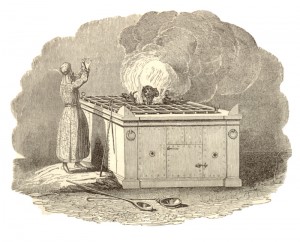
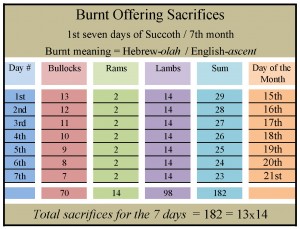
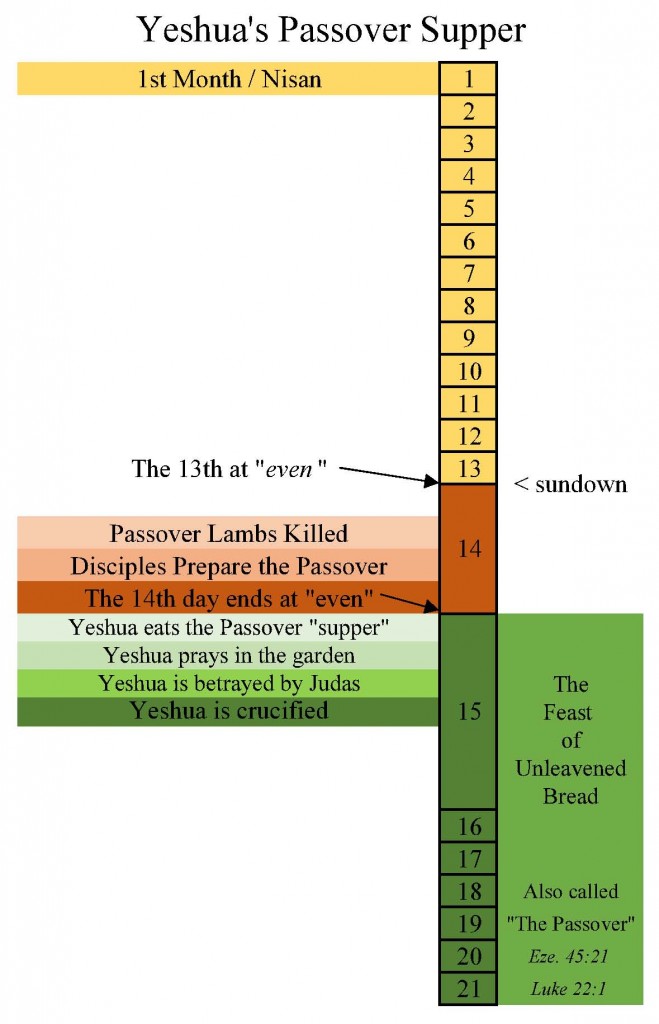
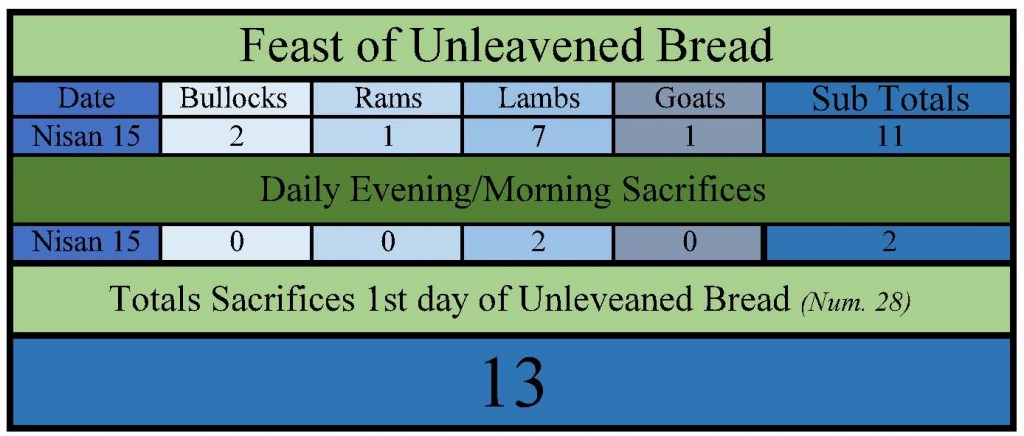
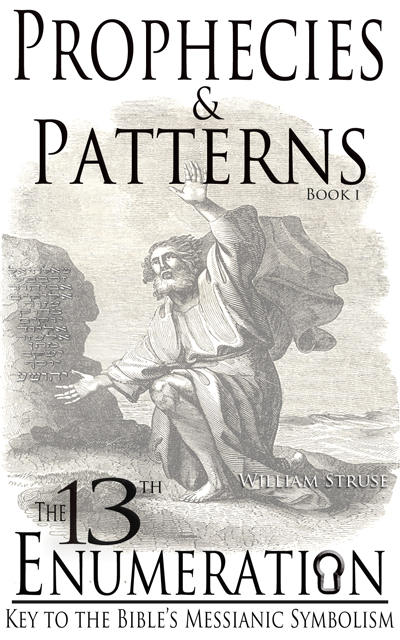
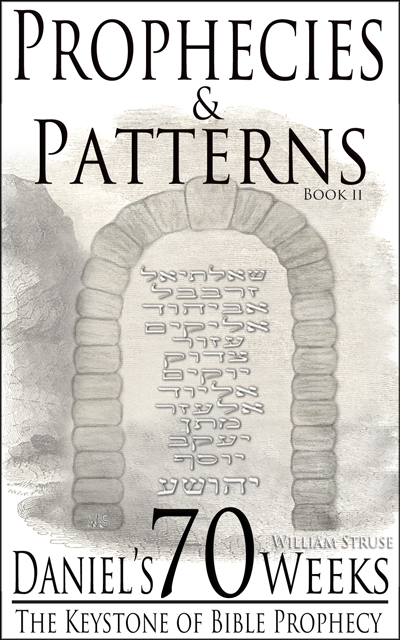
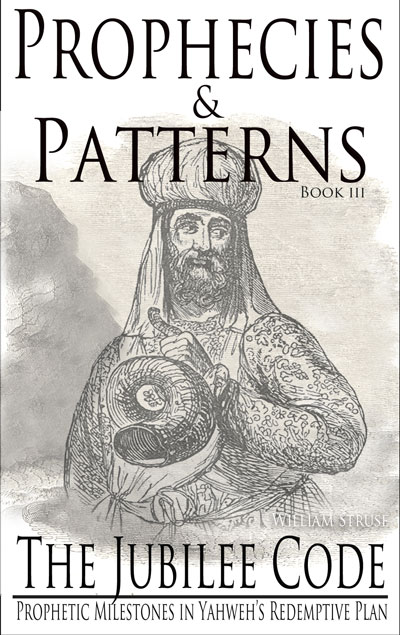
Pingback: The “Preparation” Day | The 13th Enumeration
love your post ..love YHWH..YAHSHUA..such a mystery the herbrew like a puzzle of life when you study it..and the Rauch Kodesh teaches you the hidden manna and awesome celebrating the feasts days..wish everyone would
Hi Sharon,
Thank you for your comments. It’s truly wonderful to search out the treasures YHWH has hidden for us to find.
Warm regards,
William